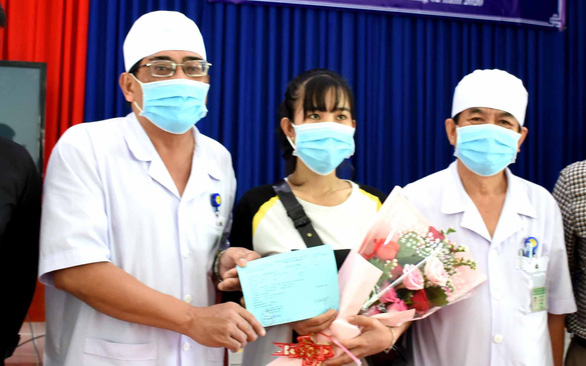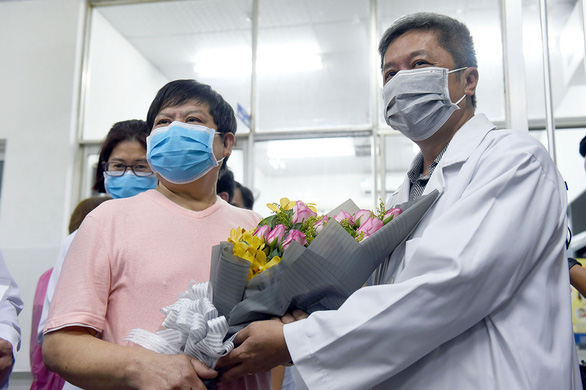Although the novel coronavirus that has sickened tens of thousands of people globally is new to science, doctors in Vietnam have successfully helped seven out of 16 confirmed cases in the country to fully recover from the disease caused by the virus.
Vietnam has so far confirmed 16 cases of the viral infection, which is now named COVID-19, including 13 Vietnamese, one Vietnamese American, and two Chinese, with the latest positive case being announced on Thursday.
Among them, seven have fully recovered and discharged from the hospital.
There has been no specific drug that kills the virus.
So doctors provide what is known as supportive care.
Two Chinese men, one with complicated pre-existing conditions
Doctor Nguyen Ngoc Sang, who is working at the Department for Tropical Diseases at Cho Ray Hospital in Ho Chi Minh City’s District 5, told Tuoi Tre (Youth) newspaper how the doctors treated the two Chinese men Li Ding and Li Zichao, who were the first two new coronavirus-infected patients confirmed in Vietnam last month, with supportive care.
The Chinese men, who are father and son, were admitted to Cho Ray Hospital on January 22 after having symptoms of a fever.
They were confirmed to be infected with the new coronavirus the next day.
Upon his admission to the hospital, 66-year-old Li Ding had a poor prognosis due to his old age and many pre-existing conditions, including lung cancer that was treated with surgery in 2018, Type 2 diabetes, and coronary artery disease, Dr. Sang said.
He added that Li’s health condition was really bad at that time as he was unable to walk and perform daily activities on his own.
Cho Ray doctors held a consultation and decided that the first step to treat the COVID-19 on the 66-year-old patient was to control his pre-existing conditions.
After controlling the father’s pre-existing conditions, the doctors started applying supportive care.
The strategy of supportive care is to monitor clinical symptoms and identify complications for timely intervention.
|
|
| Li Ding (L) receives a bouquet of flowers from a doctor upon his discharge from Cho Ray Hospital in Ho Chi Minh City, Vietnam, February 12, 2020. Photo: Duyen Phan / Tuoi Tre |
In the 28-year-old son’s case, doctors merely tried to support his body by reducing fever, enhancing personal hygiene, cleaning the throat, keeping his room airy, and providing him with physical therapy and an approriate diet.
As a result, the son recovered just three days afterward on January 26 and was discharged from Cho Ray on February 4, while the father walked out of the imfirmary eight days later.
A combination of supportive treatment, good adherence, psychotherapy
Using the same strategy of supportive care, doctors at the Khanh Hoa Hospital for Tropical Diseases in the south-central province of Khanh Hoa also suscessfully treated a local woman infected with the virus.
L.T.T.H., a 25-year-old woman from Van Ninh District, tested positive for the killer virus in both tests conducted by the Pasteur Institute of Nha Trang in Khanh Hoa and the Pasteur Institute of Ho Chi Minh City last month.
H. contracted the virus from Li Ding and Li Zichao as the two Chinese nationals stayed at a hotel in Khanh Hoa, where she works as a receptionist.
The female patient was discharged from the Khanh Hoa Hospital for Tropical Diseases on February 4 after making a full recovery.
“Doctors focused on treating each symptom [on the patient] such as having a fever or coughing,” said Nguyen Vu Quoc Binh, deputy director of the Khanh Hoa Hospital for Tropical Diseases.
“The patient was also given supplements, resistance enhancers, physical enhancement, and adequate nutrition,” Binh added.
He also hailed H.’s good adherence to doctors’ treatment as a key factor in her recovery.
In addition, H.’s recuperation was also thanks to the psychotherapy, including frequent talks and encouragement, applied by doctors during the treatment regime, according to Nguyen Dong, director of the Khanh Hoa Hospital for Tropical Diseases.
The COVID-19 has killed 1,526 people and infected nearly 66,900 globally since it first hit the central Chinese city of Wuhan in December 2019, according to the South China Morning Post.
It has spread across mainland China and to 31 other countries and regions, according to a Reuters report.
Like us on Facebook or follow us on Twitter to get the latest news about Vietnam!






















































